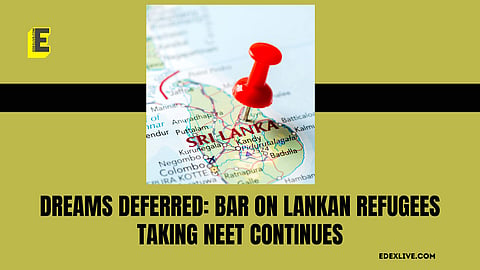

Although nursing dreams of becoming a doctor, 17-year-old S Sharina Christy, who completed schooling this year, had to be content by enrolling in a paramedical course — BSc (Operation Theatre and Anaesthesia Technology) — at a private college in Chengalpattu district.
Sharina’s identity as a Sri Lankan refugee bars the resident of the rehabilitation camp in Pudukkottai’s Thekattur from even sitting down for the National Eligibility-cum-Entrance Test (NEET), stated a report by The New Indian Express.
Sharina is not alone, as the Sri Lankan Tamils in such rehabilitation camps spread across the state have been urging the Union and state governments to allow their children to take up NEET and pursue MBBS in colleges across the country.
Dream remains a dream
For almost two decades, the ambition of such children of Sri Lankan refugees to become a doctor has remained a struggle. The last opportunity for a member of the community to pursue MBBS through reservation was in 2003, following which the special quota enjoyed by them was struck down by a Madras High Court order.
With NEET now made mandatory for admission to medical college, the Union government norms deprive the children of Sri Lankan refugees to even appear for the test. A relative of Sharina recounts, “She did not even apply for NEET owing to our refugee status and lack of necessary documents like community certificate.”
Commenting on the plight of such Sri Lankan refugees, R Padmanaban, education coordinator for OfERR (Organisation for Eelam Refugees’ Rehabilitation), said, “Since 2003, none of the students from the community has been able to become doctors. Like Tibetan refugees, who can apply for medical courses and even enjoy reservation in Himachal Pradesh, we should also be given an opportunity. This is because these children have nothing other than education to empower their life with.”
According to OfERR, a total of 227 students like Sharina residing in the 24 refugee camps in eight districts under Tiruchy region passed the Class XII Board examination in 2023-24.
Ramu Manivannan, former head of the Department of Politics and Public Administration, University of Madras, said, “Registered residents of the refugee camps should have the right to education as they consider India their permanent home. Education rights are common for both citizens and refugees.”
Education activist Prince Gajendra Babu, meanwhile, said the denial of right to education for refugees goes against the spirit of the Constitution. “If foreigners, NRIs and people of Indian origin are eligible to apply for NEET, why not add a separate category for refugees? What prevents the National Testing Agency (NTA) from doing so?”
Dr Bernard D’ Sami, former head of the Department of History at Loyola College, Chennai, said, “The Union government should devise a policy at the national level and treat all refugees equally. The Tibetan community has a higher rate of literacy due to the various schemes provided to them. It is high time they devise a policy and include all refugees in access to educational courses.”
